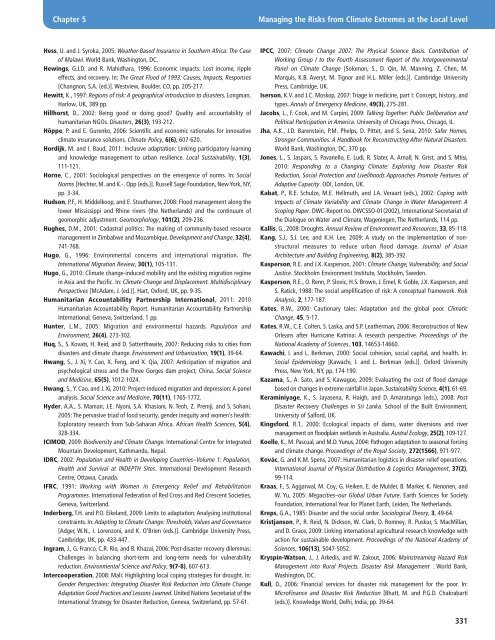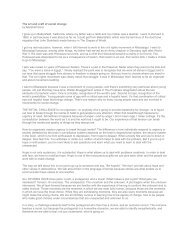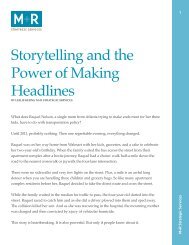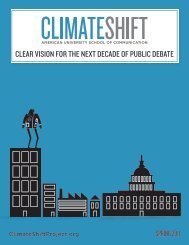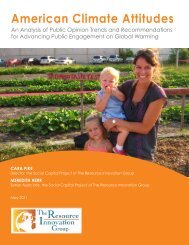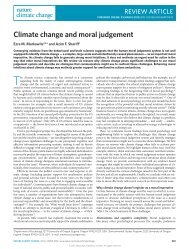<strong>Managing</strong> the <strong>Risks</strong> from <strong>Climate</strong> <strong>Extreme</strong>s at the Local LevelChapter 5Few, R. and F. Matthies, 2006: Flood hazards and health. Earthscan, London, UK.Finan, T.J. and D.R. Nelson, 2001: Making rain, making roads, making do: Public andprivate responses to drought in Ceará, Brazil. <strong>Climate</strong> Research, 19, 97-108.Finch, C., C.T. Emrich, and S.L. Cutter, 2010: Disaster disparities and differentialrecovery in New Orleans. Population and Environment, 31, 179-202.Fischer, G., H. van Velthuizen, M. Shah, and F.O. Nachtergaele, 2002: Global Agro-Ecological Assessment for Agriculture in the 21st Century: Methodology andResults. International Institute for Applied Systems Analysis, Laxenburg, Austria.Fischh<strong>of</strong>f, B., 1992: What forecasts (seem to) mean. International Journal <strong>of</strong>Forecasting, 10, 387-403.Fischh<strong>of</strong>f, B., 2007: Nonpersuasive communication about matters <strong>of</strong> greatest urgency:<strong>Climate</strong> change. Environmental Science and Technology, 41(21), 7204-7208.Ford, J., B. Smit, and J. Wandel, 2006: Vulnerability to climate change in the Arctic: Acase study from Arctic Bay, Canada. Global Environmental Change, 16(2), 145-160.Forsyth, T. and A. Walker, 2008: Forest Guardians, Forest Destroyers: The Politics <strong>of</strong>Environmental Knowledge in Northern Thailand. University <strong>of</strong> WashingtonPress, Seattle, WA, pp. 302.Fothergill, A., 1996: Gender, risk, and disaster. International Journal <strong>of</strong> MassEmergencies and Disasters, 14(1), 33-56.Fothergill, A., 1999: Women’s role in disaster. American Behavioral Science Review,7(2), 125-143.Fothergill, A., 2004: Heads above Water: Gender, Class and Family in the GrandForks Flood. SUNY Press, Albany, NY.Fritze, J., G. Blashki, S. Burke, and J. Wieseman, 2008: Hope, despair and transformation:<strong>Climate</strong> change and the promotion <strong>of</strong> mental health and well-being.International Journal <strong>of</strong> Mental Health Systems, 2, 1-12.Froukh, M.L., 2001: Decision-support system for domestic water demand forecastingand management. Water Resources Management, 15(6), 363-382.Frumkin, H. and A.J. McMichael, 2008: <strong>Climate</strong> change and public health: Thinking,communicating, acting. American Journal <strong>of</strong> Preventive Medicine, 35(5),403-410.Fuchs, R., 2009: Cities at Risk: Developing Adaptive Capacity for <strong>Climate</strong> Change inAsia’s Coastal Megacities. International START Secretariat and the East WestCenter, Washington, DC and Honolulu, HI.Fulu, E., 2007: Gender, vulnerability, and the experts: Responding to the Maldivestsunami. Development and Change, 38(5), 843-864.Gaillard, J.C. and M.L.C.J.D. Pangilinan, 2010: Participatory mapping for raisingdisaster risk awareness among the youth. Journal <strong>of</strong> Contingencies and CrisisManagement, 18(3), 175-179.Gall, M., K.A. Borden, and S.L. Cutter, 2009: When do losses count? Six fallacies <strong>of</strong>natural hazards loss data. Bulletin <strong>of</strong> the American Meteorological Society,90(6), 799-809.Galloway, G.E.J., 2007: New directions in floodplain management. Journal <strong>of</strong> theAmerican Water Resources Association, 31(3), 351-357.Galloway, G.E.J., 2009: Corps <strong>of</strong> Engineers responses to the changing nationalapproach to the floodplain management since the 1993 Midwest flood. Journal<strong>of</strong> Contemporary Water Research & Education, 130(1), 5-12.Galloway, G.E., D.F. Boesch, and R.R. Twilley, 2009: Restoring and protecting coastalLouisiana. Issues in Science and Technology, 25(2).Gedan, K.B., M.L. Kirwan, E. Wolanski, E.B. Barbier, and B.R. Silliman, 2011: The presentand future role <strong>of</strong> coastal wetland vegetation in protecting shorelines:Answering recent challenges to the paradigm. Climatic Change, 106(1), 7-29.Geiser, U. and S. Rist, 2009: Decentralization meets local complexity: Conceptualentry points, field-level findings, and insights gained. In: Decentralization MeetsLocal Complexity: Local Struggles, State Decentralization and <strong>Access</strong> to NaturalResources In South Asia And Latin America [Geiser, U. and S. Rist (eds.)].Geographica Bernesia/Swiss National Centre <strong>of</strong> Competence in Research(NCCR) North-South, Berne, Switzerland, pp. 15-55.Gething, P.W., D.L. Smith, A.P. Patil, A.J. Tatem, R.W. Snow, and S.I. Hay, 2010:<strong>Climate</strong> change and the global malaria recession. Nature, 465, 342-345.Godschalk, D.R., R. Norton, C. Richardson, and D. Salvesen, 2000: Avoiding coastalhazard areas: Best state mitigation practices. Environmental Geosciences, 7(1),13-22.Gornitz, V.N., R.C. Daniels, T.W. White, and K.R. Birdwell, 1994: The development <strong>of</strong>a coastal assessment database: Vulnerability to sea-level rise in the U.S.southeast. Journal <strong>of</strong> Coastal Research, 12, 327-338.Greater London Authority, 2010: The Draft <strong>Climate</strong> Change Adaptation Strategyfor London: Public Consultation Draft. Greater London Authority, London, UK.Greene, S., n.d.: Community Owned Vulnerability and Capacity Assessment. WorldVision, Nairobi, Kenya, .Grothmann, T. and A. Patt, 2005: Adaptive capacity and human cognition: Theprocess <strong>of</strong> individual adaptation to climate change. Global EnvironmentalChange, Part A: Human and Policy Dimensions, 15(3), 199-213.Guha-Sapir, D. and R. Below, 2002: The Quality and Accuracy <strong>of</strong> Disaster Data: AComparative Analysis <strong>of</strong> Three Global Data Sets, ProVention Consortium,Geneva, Switzerland.Haimes, Y., B. Horowitz, J. Lambert, J. Santos, C. Lian, and K. Crowther, 2005:Inoperability input-output model for interdependent infrastructure sectors. I:Theory and methodology. Journal <strong>of</strong> Infrastructure Systems, 11, 67-79.Hallegatte, S., 2008: An adaptive regional input-output model and its application tothe assessment <strong>of</strong> the economic cost <strong>of</strong> Katrina. Risk Analysis, 28(3), 779-799.Hallegatte, S. and P. Dumas, 2009: Can natural disasters have positive consequences?Investigating the role <strong>of</strong> embodied technical change. Ecological Economics,68(3), 777-786.Hallegatte, S., F. Henriet, and J. Corfee-Morlot, 2008a: The Economics <strong>of</strong> <strong>Climate</strong>Change Impacts and Policy Benefits at City Scale: A Conceptual Framework.OECD, Paris, France.Hallegatte, S., N. Patmore, O. Mestre, P. Dumas, J. Corfee-Morlot, C. Herweijer, andR.M. Wood, 2008b: Assessing <strong>Climate</strong> Change Impacts, Sea Level Rise andStorm Surge Risk in Port Cities: A Case Study on Copenhagen. OECD, Paris,France.Hallegatte, S., N. Ranger, O. Mestre, P. Dumas, J. Corfee-Morlot, C. Herweijer, and R.Muir Wood, 2011: Assessing climate change impacts, sea level rise and stormsurge risk in port cities: A case study on Copenhagen. Climatic Change, 104(1),113-137.Hamilton, J.P. and S.J. Halvorson, 2007: The 2005 Kashmir earthquake. MountainResearch and Development, 27(4), 296-301.Hammar-Klose, E. and R. Thieler, 2001: Coastal Vulnerability to Sea-Level Rise: APreliminary Database for the US Atlantic, Pacific and Gulf Of Mexico Coasts.USGS, Woods Hole, MA.Handmer, J.W., 1987: Guidelines for floodplain acquisition. Applied Geography,7(3), 203-221.Hartman, C. and G.D. Squires (eds.), 2006: There is no such thing as a naturaldisaster: Race, class, and Hurricane Katrina. Routledge, New York, NY.Hasan, A., 2007: The urban resource center, Karachi. Environment and Urbanization,19(1), 275-292.Heal, G., 1997: Discounting and climate change; an editorial comment. ClimaticChange, 37(2), 335-343.Heinrichs, D., R. Aggarwal, J. Barton, E. Bharucha, C. Butsch, M. Fragkias, P. Johnston,F. Kraas, K. Krellenberg, A. Lampis, and O.G. Ling, 2009: Adapting Cities to<strong>Climate</strong> Change: Opportunities and Constraints (Findings from Eight Cities).Paper presented at Fifth Urban Research Symposium, Marseilles, France, 28-30June 2009. World Bank, Washington DC.Heinz Center, 1999: The Hidden Costs <strong>of</strong> Coastal Hazards: Implications for RiskAssessment and Mitigation. Island Press, Washington, DC.Heinz Center, 2002: Human Links to Coastal Disasters. The H. John Heinz III Centerfor Science, Economics and the Environment, Washington, DC.Hellmuth, M.E., D.E. Osgood, U. Hess, A. Moorhead, and H. Bhojwani (eds.), 2009:Index Insurance And <strong>Climate</strong> Risk: Prospects for Development and DisasterManagement. <strong>Climate</strong> and Society No. 2, International Research Institute for<strong>Climate</strong> and Society (IRI), Columbia University, New York, NY.Helms, B., 2006: <strong>Access</strong> For All: Building Inclusive Financial Systems. World Bank,Washington, DC.Herweijer, C., N. Ranger, and R.E.T. Ward, 2009: Adaptation to climate change:Threats and opportunities for the insurance industry. The Geneva Papers, 34(3),360-380.330
Chapter 5<strong>Managing</strong> the <strong>Risks</strong> from <strong>Climate</strong> <strong>Extreme</strong>s at the Local LevelHess, U. and J. Syroka, 2005: Weather-Based Insurance in Southern Africa: The Case<strong>of</strong> Malawi. World Bank, Washington, DC.Hewings, G.J.D. and R. Mahidhara, 1996: Economic impacts: Lost income, rippleeffects, and recovery. In: The Great Flood <strong>of</strong> 1993: Causes, Impacts, Responses[Changnon, S.A. (ed.)]. Westview, Boulder, CO, pp. 205-217.Hewitt, K., 1997: Regions <strong>of</strong> risk: A geographical introduction to disasters. Longman,Harlow, UK, 389 pp.Hillhorst, D., 2002: Being good or doing good? Quality and accountability <strong>of</strong>humanitarian NGOs. Disasters, 26(3), 193-212.Höppe, P. and E. Gurenko, 2006: Scientific and economic rationales for innovativeclimate insurance solutions. <strong>Climate</strong> Policy, 6(6), 607-620.Hordijk, M. and I. Baud, 2011: Inclusive adaptation: Linking participatory learningand knowledge management to urban resilience. Local Sustainability, 1(3),111-121.Horne, C., 2001: Sociological perspectives on the emergence <strong>of</strong> norms. In: SocialNorms [Hechter, M. and K.-. Opp (eds.)]. Russell Sage Foundation, New York, NY,pp. 3-34.Hudson, P.F., H. Middelkoop, and E. Stouthamer, 2008: Flood management along thelower Mississippi and Rhine rivers (the Netherlands) and the continuum <strong>of</strong>geomorphic adjustment. Geomorphology, 101(2), 209-236.Hughes, D.M., 2001: Cadastral politics: The making <strong>of</strong> community-based resourcemanagement in Zimbabwe and Mozambique. Development and Change, 32(4),741-768.Hugo, G., 1996: Environmental concerns and international migration. TheInternational Migration Review, 30(1), 105-131.Hugo, G., 2010: <strong>Climate</strong> change-induced mobility and the existing migration regimein Asia and the Pacific. In: <strong>Climate</strong> Change and Displacement. MultidisciplinaryPerspectives [McAdam, J. (ed.)]. Hart, Oxford, UK, pp. 9-35.Humanitarian Accountability Partnership International, 2011: 2010Humanitarian Accountability Report. Humanitarian Accountability PartnershipInternational, Geneva, Switzerland, 1 pp.Hunter, L.M., 2005: Migration and environmental hazards. Population andEnvironment, 26(4), 273-302.Huq, S., S. Kovats, H. Reid, and D. Satterthwaite, 2007: Reducing risks to cities fromdisasters and climate change. Environment and Urbanization, 19(1), 39-64.Hwang, S., J. Xi, Y. Cao, X. Feng, and X. Qia, 2007: Anticipation <strong>of</strong> migration andpsychological stress and the Three Gorges dam project, China. Social Scienceand Medicine, 65(5), 1012-1024.Hwang, S., Y. Cao, and J. Xi, 2010: Project-induced migration and depression: A panelanalysis. Social Science and Medicine, 70(11), 1765-1772.Hyder, A.A., S. Maman, J.E. Nyoni, S.A. Khasiani, N. Teoh, Z. Premji, and S. Sohani,2005: The pervasive triad <strong>of</strong> food security, gender inequity and women’s health:Exploratory research from Sub-Saharan Africa. African Health Sciences, 5(4),328-334.ICIMOD, 2009: Biodiversity and <strong>Climate</strong> Change. International Centre for IntegratedMountain Development, Kathmandu, Nepal.IDRC, 2002: Population and Health in Developing Countries–Volume 1: Population,Health and Survival at INDEPTH Sites. International Development ResearchCentre, Ottawa, Canada.IFRC, 1991: Working with Women in Emergency Relief and RehabilitationProgrammes. International Federation <strong>of</strong> Red Cross and Red Crescent Societies,Geneva, Switzerland.Inderberg, T.H. and P.O. Eikeland, 2009: Limits to adaptation: Analysing institutionalconstraints. In: Adapting to <strong>Climate</strong> Change: Thresholds, Values and Governance[Adger, W.N., I. Lorenzoni, and K. O’Brien (eds.)]. Cambridge University Press,Cambridge, UK, pp. 433-447.Ingram, J., G. Franco, C.R. Rio, and B. Khazai, 2006: Post-disaster recovery dilemmas:Challenges in balancing short-term and long-term needs for vulnerabilityreduction. Environmental Science and Policy, 9(7-8), 607-613.Intercooperation, 2008: Mali: Highlighting local coping strategies for drought. In:Gender Perspectives: Integrating Disaster Risk Reduction into <strong>Climate</strong> ChangeAdaptation Good Practices and Lessons Learned. United Nations Secretariat <strong>of</strong> theInternational Strategy for Disaster Reduction, Geneva, Switzerland, pp. 57-61.<strong>IPCC</strong>, 2007: <strong>Climate</strong> Change 2007: The Physical Science Basis. Contribution <strong>of</strong>Working Group I to the Fourth Assessment Report <strong>of</strong> the IntergovernmentalPanel on <strong>Climate</strong> Change [Solomon, S., D. Qin, M. Manning, Z. Chen, M.Marquis, K.B. Averyt, M. Tignor and H.L. Miller (eds.)]. Cambridge UniversityPress, Cambridge, UK.Iserson, K.V. and J.C. Moskop, 2007: Triage in medicine, part I: Concept, history, andtypes. Annals <strong>of</strong> Emergency Medicine, 49(3), 275-281.Jacobs, L., F. Cook, and M. Carpini, 2009: Talking Together: Public Deliberation andPolitical Participation in America. University <strong>of</strong> Chicago Press, Chicago, IL.Jha, A.K., J.D. Barenstein, P.M. Phelps, D. Pittet, and S. Sena, 2010: Safer Homes,Stronger Communities: A Handbook for Reconstructing After Natural Disasters.World Bank, Washington, DC, 370 pp.Jones, L., S. Jaspars, S. Pavanello, E. Ludi, R. Slater, A. Arnall, N. Grist, and S. Mtisi,2010: Responding to a Changing <strong>Climate</strong>: Exploring how Disaster RiskReduction, Social Protection and Livelihoods Approaches Promote Features <strong>of</strong>Adaptive Capacity. ODI, London, UK.Kabat, P., R.E. Schulze, M.E. Hellmuth, and J.A. Veraart (eds.), 2002: Coping withImpacts <strong>of</strong> <strong>Climate</strong> Variability and <strong>Climate</strong> Change in Water Management: AScoping Paper. DWC-Report no. DWCSSO-01(2002), International Secretariat <strong>of</strong>the Dialogue on Water and <strong>Climate</strong>, Wageningen, The Netherlands, 114 pp.Kallis, G., 2008: Droughts. Annual Review <strong>of</strong> Environment and Resources, 33, 85-118.Kang, S.J., S.J. Lee, and K.H. Lee, 2009: A study on the implementation <strong>of</strong> nonstructuralmeasures to reduce urban flood damage. Journal <strong>of</strong> AsianArchitecture and Building Engineering, 8(2), 385-392.Kasperson, R.E. and J.X. Kasperson, 2001: <strong>Climate</strong> Change, Vulnerability, and SocialJustice. Stockholm Environment Institute, Stockholm, Sweden.Kasperson, R.E., O. Renn, P. Slovic, H.S. Brown, J. Emel, R. Goble, J.X. Kasperson, andS. Ratick, 1988: The social amplification <strong>of</strong> risk: A conceptual framework. RiskAnalysis, 2, 177-187.Kates, R.W., 2000: Cautionary tales: Adaptation and the global poor. ClimaticChange, 45, 5-17.Kates, R.W., C.E. Colten, S. Laska, and S.P. Leatherman, 2006: Reconstruction <strong>of</strong> NewOrleans after Hurricane Katrina: A research perspective. Proceedings <strong>of</strong> theNational Academy <strong>of</strong> Sciences, 103, 14653-14660.Kawachi, I. and L. Berkman, 2000: Social cohesion, social capital, and health. In:Social Epidemiology [Kawachi, I. and L. Berkman (eds.)]. Oxford UniversityPress, New York, NY, pp. 174-190.Kazama, S., A. Sato, and S. Kawagoe, 2009: Evaluating the cost <strong>of</strong> flood damagebased on changes in extreme rainfall in Japan. Sustainability Science, 4(1), 61-69.Keraminiyage, K., S. Jayasena, R. Haigh, and D. Amaratunga (eds.), 2008: PostDisaster Recovery Challenges in Sri Lanka. School <strong>of</strong> the Built Environment,University <strong>of</strong> Salford, UK.Kingsford, R.T., 2000: Ecological impacts <strong>of</strong> dams, water diversions and rivermanagement on floodplain wetlands in Australia. Austral Ecology, 25(2), 109-127.Koelle, K., M. Pascual, and M.D. Yunus, 2004: Pathogen adaptation to seasonal forcingand climate change. Proceedings <strong>of</strong> the Royal Society, 272(1566), 971-977.Kovác, G. and K.M. Spens, 2007: Humanitarian logistics in disaster relief operations.International Journal <strong>of</strong> Physical Distribution & Logistics Management, 37(2),99-114.Kraas, F., S. Aggarwal, M. Coy, G. Heiken, E. de Mulder, B. Marker, K. Nenonen, andW. Yu, 2005: Megacities–our Global Urban Future. Earth Sciences for SocietyFoundation, International Year for Planet Earth, Leiden, The Netherlands.Kreps, G.A., 1985: Disaster and the social order. Sociological Theory, 3, 49-64.Kristjanson, P., R. Reid, N. Dickson, W. Clark, D. Romney, R. Puskur, S. MacMillan,and D. Grace, 2009: Linking international agricultural research knowledge withaction for sustainable development. Proceedings <strong>of</strong> the National Academy <strong>of</strong>Sciences, 106(13), 5047-5052.Kryspin-Watson, J., J. Arkedis, and W. Zakout, 2006: Mainstreaming Hazard RiskManagement into Rural Projects. Disaster Risk Management . World Bank,Washington, DC.Kull, D., 2006: Financial services for disaster risk management for the poor. In:MicroFinance and Disaster Risk Reduction [Bhatt, M. and P.G.D. Chakrabarti(eds.)]. Knowledge World, Delhi, India, pp. 39-64.331
- Page 1:
MANAGING THE RISKS OF EXTREMEEVENTS
- Page 5:
Managing the Risks of Extreme Event
- Page 9 and 10:
I Foreword and Preface
- Page 12 and 13:
Prefacein understanding and managin
- Page 17 and 18:
Summary for PolicymakersBox SPM.1 |
- Page 19 and 20:
Summary for PolicymakersB.or sub-na
- Page 21 and 22:
Summary for PolicymakersIt is likel
- Page 23:
Summary for Policymakersmicro-insur
- Page 27 and 28:
Summary for PolicymakersIt is very
- Page 29 and 30:
Summary for PolicymakersOther low-r
- Page 31 and 32:
Summary for PolicymakersTable SPM.1
- Page 33 and 34:
Summary for PolicymakersBox SPM.2 |
- Page 35:
III Chapters 1 to 9
- Page 38 and 39:
Climate Change: New Dimensions in D
- Page 40 and 41:
Climate Change: New Dimensions in D
- Page 42 and 43:
Climate Change: New Dimensions in D
- Page 44 and 45:
Climate Change: New Dimensions in D
- Page 46 and 47:
Climate Change: New Dimensions in D
- Page 48 and 49:
Climate Change: New Dimensions in D
- Page 50 and 51:
Climate Change: New Dimensions in D
- Page 52 and 53:
Climate Change: New Dimensions in D
- Page 54 and 55:
Climate Change: New Dimensions in D
- Page 56 and 57:
Climate Change: New Dimensions in D
- Page 58 and 59:
Climate Change: New Dimensions in D
- Page 60 and 61:
Climate Change: New Dimensions in D
- Page 62 and 63:
Climate Change: New Dimensions in D
- Page 64 and 65:
Climate Change: New Dimensions in D
- Page 66 and 67:
Climate Change: New Dimensions in D
- Page 68 and 69:
Climate Change: New Dimensions in D
- Page 70 and 71:
Climate Change: New Dimensions in D
- Page 72 and 73:
Climate Change: New Dimensions in D
- Page 74 and 75:
Climate Change: New Dimensions in D
- Page 76 and 77:
Climate Change: New Dimensions in D
- Page 78 and 79:
Determinants of Risk: Exposure and
- Page 80 and 81:
Determinants of Risk: Exposure and
- Page 82 and 83:
Determinants of Risk: Exposure and
- Page 84 and 85:
Determinants of Risk: Exposure and
- Page 86 and 87:
Determinants of Risk: Exposure and
- Page 88 and 89:
Determinants of Risk: Exposure and
- Page 90 and 91:
Determinants of Risk: Exposure and
- Page 92 and 93:
Determinants of Risk: Exposure and
- Page 94 and 95:
Determinants of Risk: Exposure and
- Page 96 and 97:
Determinants of Risk: Exposure and
- Page 98 and 99:
Determinants of Risk: Exposure and
- Page 100 and 101:
Determinants of Risk: Exposure and
- Page 102 and 103:
Determinants of Risk: Exposure and
- Page 104 and 105:
Determinants of Risk: Exposure and
- Page 106 and 107:
Determinants of Risk: Exposure and
- Page 108 and 109:
Determinants of Risk: Exposure and
- Page 110 and 111:
Determinants of Risk: Exposure and
- Page 112 and 113:
Determinants of Risk: Exposure and
- Page 114 and 115:
Determinants of Risk: Exposure and
- Page 116 and 117:
Determinants of Risk: Exposure and
- Page 118 and 119:
Determinants of Risk: Exposure and
- Page 120 and 121:
Determinants of Risk: Exposure and
- Page 122 and 123:
Changes in Climate Extremes and the
- Page 124 and 125:
Changes in Climate Extremes and the
- Page 126 and 127:
Changes in Climate Extremes and the
- Page 128 and 129:
Changes in Climate Extremes and the
- Page 130 and 131:
Changes in Climate Extremes and the
- Page 132 and 133:
Changes in Climate Extremes and the
- Page 134 and 135:
Changes in Climate Extremes and the
- Page 136 and 137:
Changes in Climate Extremes and the
- Page 138 and 139:
Changes in Climate Extremes and the
- Page 140 and 141:
Changes in Climate Extremes and the
- Page 142 and 143:
Changes in Climate Extremes and the
- Page 144 and 145:
Changes in Climate Extremes and the
- Page 146 and 147:
Changes in Climate Extremes and the
- Page 148 and 149:
Changes in Climate Extremes and the
- Page 150 and 151:
138much of the continental United S
- Page 152 and 153:
Changes in Climate Extremes and the
- Page 154 and 155:
Changes in Climate Extremes and the
- Page 156 and 157:
Changes in Climate Extremes and the
- Page 158 and 159:
Changes in Climate Extremes and the
- Page 160 and 161:
Changes in Climate Extremes and the
- Page 162 and 163:
Changes in Climate Extremes and the
- Page 164 and 165:
Changes in Climate Extremes and the
- Page 166 and 167:
Changes in Climate Extremes and the
- Page 168 and 169:
Changes in Climate Extremes and the
- Page 170 and 171:
Changes in Climate Extremes and the
- Page 172 and 173:
Changes in Climate Extremes and the
- Page 174 and 175:
Changes in Climate Extremes and the
- Page 176 and 177:
Changes in Climate Extremes and the
- Page 178 and 179:
Changes in Climate Extremes and the
- Page 180 and 181:
Changes in Climate Extremes and the
- Page 182 and 183:
Changes in Climate Extremes and the
- Page 184 and 185:
Changes in Climate Extremes and the
- Page 186 and 187:
Changes in Climate Extremes and the
- Page 188 and 189:
Changes in Climate Extremes and the
- Page 190 and 191:
Changes in Climate Extremes and the
- Page 192 and 193:
Changes in Climate Extremes and the
- Page 194 and 195:
Changes in Climate Extremes and the
- Page 196 and 197:
Changes in Climate Extremes and the
- Page 198 and 199:
Changes in Climate Extremes and the
- Page 200 and 201:
Changes in Climate Extremes and the
- Page 202 and 203:
Changes in Climate Extremes and the
- Page 204 and 205:
Changes in Climate Extremes and the
- Page 206 and 207:
Changes in Climate Extremes and the
- Page 208 and 209:
Changes in Climate Extremes and the
- Page 210 and 211:
Changes in Climate Extremes and the
- Page 212 and 213:
Changes in Climate Extremes and the
- Page 214 and 215:
Changes in Climate Extremes and the
- Page 216 and 217:
Changes in Climate Extremes and the
- Page 218 and 219:
Changes in Climate Extremes and the
- Page 220 and 221:
Changes in Climate Extremes and the
- Page 222 and 223:
Changes in Climate Extremes and the
- Page 224 and 225:
Changes in Climate Extremes and the
- Page 226 and 227:
Changes in Climate Extremes and the
- Page 228 and 229:
Changes in Climate Extremes and the
- Page 230 and 231:
Changes in Climate Extremes and the
- Page 232 and 233:
Changes in Climate Extremes and the
- Page 234 and 235:
Changes in Climate Extremes and the
- Page 236 and 237:
Changes in Climate Extremes and the
- Page 238 and 239:
Changes in Climate Extremes and the
- Page 240 and 241:
Changes in Climate Extremes and the
- Page 242 and 243:
Changes in Climate Extremes and the
- Page 244 and 245:
Changes in Impacts of Climate Extre
- Page 246 and 247:
Changes in Impacts of Climate Extre
- Page 248 and 249:
Changes in Impacts of Climate Extre
- Page 250 and 251:
Changes in Impacts of Climate Extre
- Page 252 and 253:
Changes in Impacts of Climate Extre
- Page 254 and 255:
Changes in Impacts of Climate Extre
- Page 256 and 257:
Changes in Impacts of Climate Extre
- Page 258 and 259:
Changes in Impacts of Climate Extre
- Page 260 and 261:
Changes in Impacts of Climate Extre
- Page 262 and 263:
Changes in Impacts of Climate Extre
- Page 264 and 265:
Changes in Impacts of Climate Extre
- Page 266 and 267:
Changes in Impacts of Climate Extre
- Page 268 and 269:
Changes in Impacts of Climate Extre
- Page 270 and 271:
Changes in Impacts of Climate Extre
- Page 272 and 273:
Changes in Impacts of Climate Extre
- Page 274 and 275:
Changes in Impacts of Climate Extre
- Page 276 and 277:
Changes in Impacts of Climate Extre
- Page 278 and 279:
Changes in Impacts of Climate Extre
- Page 280 and 281:
Changes in Impacts of Climate Extre
- Page 282 and 283:
Changes in Impacts of Climate Extre
- Page 284 and 285:
Changes in Impacts of Climate Extre
- Page 286 and 287:
Changes in Impacts of Climate Extre
- Page 288 and 289:
Changes in Impacts of Climate Extre
- Page 290 and 291:
Changes in Impacts of Climate Extre
- Page 292 and 293: Changes in Impacts of Climate Extre
- Page 294 and 295: Changes in Impacts of Climate Extre
- Page 296 and 297: Changes in Impacts of Climate Extre
- Page 298 and 299: Changes in Impacts of Climate Extre
- Page 300 and 301: Changes in Impacts of Climate Extre
- Page 302 and 303: Changes in Impacts of Climate Extre
- Page 304 and 305: Managing the Risks from Climate Ext
- Page 306 and 307: Managing the Risks from Climate Ext
- Page 308 and 309: Managing the Risks from Climate Ext
- Page 310 and 311: Managing the Risks from Climate Ext
- Page 312 and 313: Managing the Risks from Climate Ext
- Page 314 and 315: Managing the Risks from Climate Ext
- Page 316 and 317: Managing the Risks from Climate Ext
- Page 318 and 319: Managing the Risks from Climate Ext
- Page 320 and 321: Managing the Risks from Climate Ext
- Page 322 and 323: Managing the Risks from Climate Ext
- Page 324 and 325: Managing the Risks from Climate Ext
- Page 326 and 327: Managing the Risks from Climate Ext
- Page 328 and 329: Managing the Risks from Climate Ext
- Page 330 and 331: Managing the Risks from Climate Ext
- Page 332 and 333: Managing the Risks from Climate Ext
- Page 334 and 335: Managing the Risks from Climate Ext
- Page 336 and 337: Managing the Risks from Climate Ext
- Page 338 and 339: Managing the Risks from Climate Ext
- Page 340 and 341: Managing the Risks from Climate Ext
- Page 344 and 345: Managing the Risks from Climate Ext
- Page 346 and 347: Managing the Risks from Climate Ext
- Page 348 and 349: Managing the Risks from Climate Ext
- Page 350 and 351: Managing the Risks from Climate Ext
- Page 352 and 353: National Systems for Managing the R
- Page 354 and 355: National Systems for Managing the R
- Page 356 and 357: National Systems for Managing the R
- Page 358 and 359: National Systems for Managing the R
- Page 360 and 361: National Systems for Managing the R
- Page 362 and 363: National Systems for Managing the R
- Page 364 and 365: National Systems for Managing the R
- Page 366 and 367: National Systems for Managing the R
- Page 368 and 369: National Systems for Managing the R
- Page 370 and 371: National Systems for Managing the R
- Page 372 and 373: National Systems for Managing the R
- Page 374 and 375: National Systems for Managing the R
- Page 376 and 377: National Systems for Managing the R
- Page 378 and 379: National Systems for Managing the R
- Page 380 and 381: National Systems for Managing the R
- Page 382 and 383: National Systems for Managing the R
- Page 384 and 385: National Systems for Managing the R
- Page 386 and 387: National Systems for Managing the R
- Page 388 and 389: National Systems for Managing the R
- Page 390 and 391: National Systems for Managing the R
- Page 392 and 393:
National Systems for Managing the R
- Page 394 and 395:
National Systems for Managing the R
- Page 396 and 397:
National Systems for Managing the R
- Page 398 and 399:
National Systems for Managing the R
- Page 400 and 401:
National Systems for Managing the R
- Page 402 and 403:
National Systems for Managing the R
- Page 404 and 405:
National Systems for Managing the R
- Page 406 and 407:
Managing the Risks: International L
- Page 408 and 409:
Managing the Risks: International L
- Page 410 and 411:
Managing the Risks: International L
- Page 412 and 413:
Managing the Risks: International L
- Page 414 and 415:
Managing the Risks: International L
- Page 416 and 417:
Managing the Risks: International L
- Page 418 and 419:
Managing the Risks: International L
- Page 420 and 421:
Managing the Risks: International L
- Page 422 and 423:
Managing the Risks: International L
- Page 424 and 425:
Managing the Risks: International L
- Page 426 and 427:
Managing the Risks: International L
- Page 428 and 429:
Managing the Risks: International L
- Page 430 and 431:
Managing the Risks: International L
- Page 432 and 433:
Managing the Risks: International L
- Page 434 and 435:
Managing the Risks: International L
- Page 436 and 437:
Managing the Risks: International L
- Page 438 and 439:
Managing the Risks: International L
- Page 440 and 441:
Managing the Risks: International L
- Page 442 and 443:
Managing the Risks: International L
- Page 444 and 445:
Managing the Risks: International L
- Page 446 and 447:
Managing the Risks: International L
- Page 448 and 449:
Managing the Risks: International L
- Page 450 and 451:
Toward a Sustainable and Resilient
- Page 452 and 453:
Toward a Sustainable and Resilient
- Page 454 and 455:
Toward a Sustainable and Resilient
- Page 456 and 457:
Toward a Sustainable and Resilient
- Page 458 and 459:
Toward a Sustainable and Resilient
- Page 460 and 461:
Toward a Sustainable and Resilient
- Page 462 and 463:
Toward a Sustainable and Resilient
- Page 464 and 465:
Toward a Sustainable and Resilient
- Page 466 and 467:
Toward a Sustainable and Resilient
- Page 468 and 469:
Toward a Sustainable and Resilient
- Page 470 and 471:
Toward a Sustainable and Resilient
- Page 472 and 473:
Toward a Sustainable and Resilient
- Page 474 and 475:
Toward a Sustainable and Resilient
- Page 476 and 477:
Toward a Sustainable and Resilient
- Page 478 and 479:
Toward a Sustainable and Resilient
- Page 480 and 481:
Toward a Sustainable and Resilient
- Page 482 and 483:
Toward a Sustainable and Resilient
- Page 484 and 485:
Toward a Sustainable and Resilient
- Page 486 and 487:
Toward a Sustainable and Resilient
- Page 488 and 489:
Toward a Sustainable and Resilient
- Page 490 and 491:
Toward a Sustainable and Resilient
- Page 492 and 493:
Toward a Sustainable and Resilient
- Page 494 and 495:
Toward a Sustainable and Resilient
- Page 496 and 497:
Toward a Sustainable and Resilient
- Page 498 and 499:
Toward a Sustainable and Resilient
- Page 500 and 501:
Case StudiesChapter 9Table of Conte
- Page 502 and 503:
Case StudiesChapter 99.1. Introduct
- Page 504 and 505:
Case StudiesChapter 9••••
- Page 506 and 507:
Case StudiesChapter 99.2.1.2.3. Hea
- Page 508 and 509:
Case StudiesChapter 9preparedness c
- Page 510 and 511:
Case StudiesChapter 99.2.2.5. Outco
- Page 512 and 513:
Case StudiesChapter 9practices at b
- Page 514 and 515:
Case StudiesChapter 9to implement s
- Page 516 and 517:
Case StudiesChapter 9lined by the w
- Page 518 and 519:
Case StudiesChapter 94.5 million af
- Page 520 and 521:
Case StudiesChapter 9are typically
- Page 522 and 523:
Case StudiesChapter 9heightens vuln
- Page 524 and 525:
Case StudiesChapter 9multi-hazard r
- Page 526 and 527:
Case StudiesChapter 9Bank, 2005b).
- Page 528 and 529:
Case StudiesChapter 9Some federal-l
- Page 530 and 531:
Case StudiesChapter 9develop in a m
- Page 532 and 533:
Case StudiesChapter 9Most states ha
- Page 534 and 535:
Case StudiesChapter 9reduction legi
- Page 536 and 537:
Case StudiesChapter 9countries. Thr
- Page 538 and 539:
Case StudiesChapter 99.2.14. Educat
- Page 540 and 541:
Case StudiesChapter 9to be removed
- Page 542 and 543:
Case StudiesChapter 9can help to ad
- Page 544 and 545:
Case StudiesChapter 9CRED, 2009: EM
- Page 546 and 547:
Case StudiesChapter 9Hallegatte, S.
- Page 548 and 549:
Case StudiesChapter 9Linnerooth-Bay
- Page 550 and 551:
Case StudiesChapter 9O’Neill, M.S
- Page 552 and 553:
Case StudiesChapter 9Skaff, M. and
- Page 554 and 555:
Case StudiesChapter 9Visser, R. and
- Page 557 and 558:
ANNEXI Authors and Expert Reviewers
- Page 559 and 560:
Annex IAuthors and Expert Reviewers
- Page 561 and 562:
Annex IAuthors and Expert Reviewers
- Page 563 and 564:
Annex IAuthors and Expert Reviewers
- Page 565 and 566:
Annex IAuthors and Expert Reviewers
- Page 567 and 568:
ANNEXIIGlossary of TermsThis annex
- Page 569 and 570:
Annex IIGlossary of Termswater vapo
- Page 571 and 572:
Annex IIGlossary of Termsdrought, a
- Page 573 and 574:
Annex IIGlossary of TermsImpactsEff
- Page 575 and 576:
Annex IIGlossary of Termsforcing is
- Page 577 and 578:
ANNEXIIIAcronyms565
- Page 579 and 580:
Annex IIIAcronymsNAMNAONAPANaTechND
- Page 581 and 582:
ANNEXIVList of Major IPCC Reports56
- Page 583 and 584:
Annex IVList of Major IPCC ReportsC
- Page 585 and 586:
Index573
- Page 587 and 588:
Indexresilience building, 378touris
- Page 589 and 590:
IndexEM-DAT database, 364Emissions
- Page 591 and 592:
Indextransformation and, 324See als
- Page 593 and 594:
IndexRisk sharing, 10-11, 397, 523i


